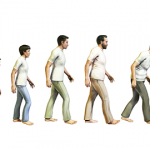The issue of physician aging and retirement is particularly acute for rheumatology, a field in which we face two issues. The first is a significant staffing shortage with some areas lacking any rheumatologic care. The second is the mean age of rheumatologists, which is perilously approaching the imaginings of Paul McCartney in the memorable Beatles tune, When I’m 64. Adding to this concern are the findings of a recent workforce projection study funded by the ACR, that predicts our numbers will drop by another 30% by 2025.6 Sightings of practicing rheumatologists will be rare.
We need to embrace change. To do so, we need to devise strategies that will help keep us mentally & physically in the game for years to come.
The Doctor & The Aging Brain
How should society and the medical profession deal with an aging workforce?7 Should clinicians be asked or forced to retire from their métier when they reach a specified age? Take your bow, and exit stage left. Undoubtedly, most have paid their dues, toiling in the trenches, working to help their patients get better, advocating on their behalf, sharing the good times and the bad.
If blessed with good health and adequate finances, perhaps the time has come for them to move on to their next act. But what if there is no next act? What if they just want to maintain their role as a rheumatologist, in the clinic, the lab or the classroom? Is there a problem with that? After all, these are highly trained and seasoned practitioners whose wealth of knowledge and skill sets, honed by years of practice, enabled them to serve as wonderful teachers and mentors for trainees and junior colleagues. Why leave now?
To start with, there is the matter of the aging brain and its potential impact on our clinical judgment. A decline in neurocognitive function is an inevitable part of aging. As doctors, we rely on our ability to process new information and use reasoning to problem solve. Lacking that ability in the clinic or the lab, we become lost souls. Yet who should decide if or when this situation has been reached?7 It probably should not be us.
Doctors may not be the best judges of their ability to practice medicine. In a survey of more than 500 retired orthopedic surgeons who were asked why they retired, the response, “I no longer felt competent,” was not selected by anyone.8 Other studies have noted an inverse relationship between poor external assessment of a doctor’s skills and the physician’s own self-assessment.9 Several studies have noted that poorer clinical outcomes have been linked to the age of the practitioner.7 For example, one study observed that areas with high concentrations of young endocrinologists showed an increased incidence of thyroid cancer compared with areas of high concentrations of their older colleagues. In fact, this supposedly higher rate turned out to be the result of increased adoption of thyroid ultrasound and fine needle aspiration among younger physicians who trained after these diagnostic tools became commonplace.10 Several similar observations have linked better patient outcomes with a younger treating physician, suggesting that these findings are unlikely limited to a handful of medical or surgical specialties.11


